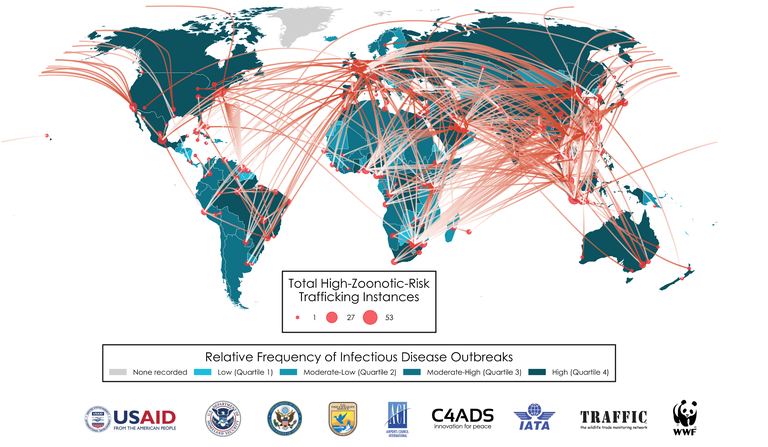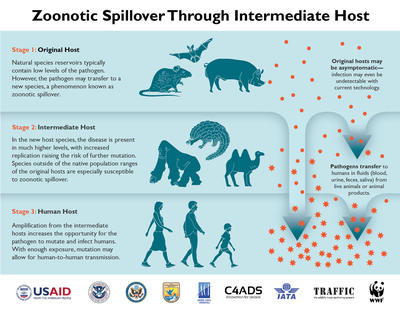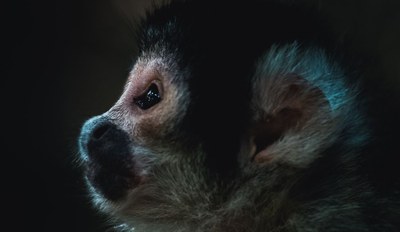REPORT: COVID-19 Underscores Global Need to Combat Animal Smuggling in Aviation
Sep 02, 2020
The aviation sector can play a part in mitigating the risk of future disease events and pandemics by strengthening efforts to combat animal smuggling, according to a new analysis. The brief, Animal Smuggling in Air Transport and Preventing Zoonotic Spillover, produced by C4ADS as part of the USAID Reducing Opportunities for Unlawful Transport of Endangered Species (ROUTES) Partnership, details the financial impact of zoonotic diseases on the aviation industry, methods for identifying high-zoonotic-risk trafficking, and recommendations to help prevent the spread of future outbreaks.
Within air transport, live animals and meat products from domesticated and wild species engender the most significant risk of zoonotic spillover from animal smuggling. According to the C4ADS Air Seizure Database, almost 500 high-zoonotic-risk trafficking instances across 104 countries were identified in the air transport sector between 2009–2019. That amounts to approximately 50 high-zoonotic-risk trafficking instances every year, based solely on public reporting.

"Smugglers exploit the speed and efficiency of air travel and air cargo to transport animals and animal products, often bringing different species in close proximity for long periods of time. This illicit activity circumvents animal safety requirements around health examinations, vaccinations, or quarantine, creating extremely favorable conditions for zoonotic disease spillover,” said author Ben Spevack, Senior Analyst at C4ADS.
The frequency, severity, and financial impacts of zoonotic disease events are growing, according to the brief’s analysis. The current COVID-19 pandemic has shown that zoonotic diseases pose an existential threat to the aviation sector. The International Air Transport Association (IATA) estimates a USD 419 billion revenue loss for the airline industry over the course of the pandemic, and Airports Council International (ACI) estimates a loss of USD 104.5 billion (60%) airport global revenues as a result of COVID-19 in 2020.
 “Faced with the current health crisis caused by the novel COVID-19 virus, the world and aviation sector are unfortunately grappling with the turmoil that zoonotic diseases can pose. Understanding of air transport’s risk from animal smuggling could be instrumental in reducing global vulnerability. Comprehensive training and protocols are already being adopted by airports, airlines, and enforcement agencies to combat wildlife trafficking. These efforts can help mitigate the risk of future outbreaks,” said Michelle Owen, ROUTES Lead.
“Faced with the current health crisis caused by the novel COVID-19 virus, the world and aviation sector are unfortunately grappling with the turmoil that zoonotic diseases can pose. Understanding of air transport’s risk from animal smuggling could be instrumental in reducing global vulnerability. Comprehensive training and protocols are already being adopted by airports, airlines, and enforcement agencies to combat wildlife trafficking. These efforts can help mitigate the risk of future outbreaks,” said Michelle Owen, ROUTES Lead.
“As the world works to recover from COVID-19, the focus is shifting to building back better and with greater resilience. Science tells us to expect more pandemics in the future and combatting the smuggling of wildlife can be viewed as a key prevention measure” said Sebastian Mikosz, Senior Vice President of Member and External Relations at IATA.
“The current crisis has highlighted the global need to better understand what factors can increase the risk of zoonotic disease occurrence. Cooperation among governments, enforcement authorities, scientists, conservation organizations, industry stakeholders, and customers is crucial to address these issues. ACI joined the fight against wildlife trafficking in 2016 and supports Buckingham Palace Declaration signatory airports and ROUTES partners to combat wildlife trafficking. Airports can integrate wildlife conservation initiatives into their sustainability umbrella, helping to protect biodiversity, sustainable livelihoods, stability and global health.” said Juliana Scavuzzi, Senior Manager Environment, ACI.
View the full report here: https://routespartnership.org/industry-resources/publications/animalsmuggling/view
View the ROUTES Dashboard: http://www.routesdashboard.org/
###
About ROUTES
The USAID Reducing Opportunities for Unlawful Transport of Endangered Species (ROUTES) Partnership brings together transport and logistics companies, government agencies, development group, law enforcement conservation organizations, academia and donors to disrupt wildlife trafficking activities, and forms a key element of the concerted international response to addressing wildlife poaching and associated criminal activities worldwide.
At the heart of ROUTES is a core group of partners collaborating with the U.S. Government and the transport sector that includes Airports Council International (ACI), the Center for Advanced Defense Studies (C4ADS), the International Air Transport Association (IATA), TRAFFIC and WWF. The Partnership is funded by USAID and coordinated by TRAFFIC. To learn more, visit routespartnership.org or follow @ROUTESPartners
About USAID
The United States Agency for International Development (USAID) is responsible for the majority of overseas development assistance from the United States Government and leads international development and humanitarian efforts to save lives, reduce poverty, strengthen democratic governance and help people on their journey to self-reliance. For more information please visit usaid.gov or follow @USAID on Facebook and Twitter.
About C4ADS
C4ADS is a nonprofit organization dedicated to providing data-driven analysis and evidence-based reporting on global conflict and transnational security issues. We use cutting-edge technologies to manage, integrate, and analyze disparate data from diverse languages, regions, and sources, incorporating our own field research from conflict zones and fragile states. We seek to engage with local and international audiences and produce compelling analysis on conflict and security issues. In doing so, we fill a critical gap left by traditional public sector and profit-driven institutions. For more information, visit c4ads.org or follow @C4ADS
About TRAFFIC
TRAFFIC, the wildlife trade monitoring network, is the leading non-governmental organization working globally on trade in wild animals and plants in the context of both biodiversity conservation and sustainable development. For more information, visit traffic.org or follow @TRAFFIC_WLTrade
About ACI
Airports Council International (ACI), the trade association of the world’s airports, was founded in 1991 with the objective of fostering cooperation among its member airports and other partners in world aviation, including the International Civil Aviation Organization, the International Air Transport Association and the Civil Air Navigation Services Organisation. In representing the best interests of airports during key phases of policy development, ACI makes a significant contribution toward ensuring the global air transport system is safe, secure, efficient and environmentally sustainable. As of January 2020, ACI serves 668 members, operating 1979 airports in 176 countries.For more information, visit aci.aero or follow @ACIWorld.
About IATA
The International Air Transport Association (IATA) is the trade association for the world’s airlines, representing some 290 airlines or 82% of total air traffic. IATA supports many areas of aviation activity and helps formulate industry policy on critical aviation issues. For more information, visit IATA.org or follow@IATA2press


